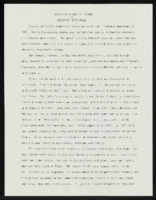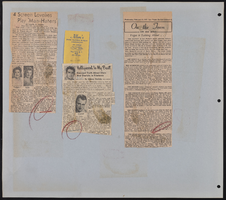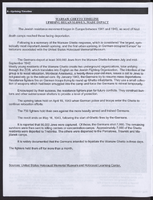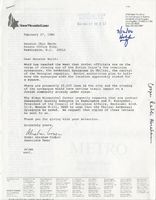Search the Special Collections and Archives Portal
Search Results

Transcript of interview with Theda Kay Grinnell by Fletcher Corey, February 28, 1977
Date
Archival Collection
Description
On February 28, 1977, Fletcher Corey interviewed Theda Kay Grinnell (born 1935 in New London, Iowa) about her life in Las Vegas, Nevada. Grinnell first talks about her move to Nevada and both her and her husband’s work at the Nevada Test Site. She also talks about the atomic blasts, competition with Russia, and her employment that followed her work at the Test Site. Grinnell later talks about her church membership and goes into detail about the race riots and how they involved and impacted her and her son. The end of the interview includes discussion on flash floods, the culinary union, how World War II affected the Las Vegas industry, and the social changes in Las Vegas.
Text

"Apologies Across The Board": article draft by Roosevelt Fitzgerald
Date
Archival Collection
Description
From the Roosevelt Fitzgerald Professional Papers (MS-01082) -- Drafts for the Las Vegas Sentinel Voice file. On Las Vegas fire chief publicizing excellent work ethic of LDS firefighters.
Text

Stella Kalaoram oral history interview: transcript
Date
Archival Collection
Description
Oral history interview with Stella Kalaoram conducted by Kristel Peralta and Cecilia Winchell on August 2, 2021 for Reflections: The Las Vegas Asian American and Pacific Islander Oral History Project. Stella Kalaoram discusses her childhood in Singapore, the occupations and ethnic diversity of her family, and the four languages she speaks: English, Mandarin, Malay, and Tamil. She shares her immigration journey to the United States with her husband, from Singapore to San Bernardino, California in 1990, and their move to Las Vegas in 2000. Stella also shares her employment experiences as a dental assistant, a housekeeper for the Cosmopolitan Hotel and Casino, and as a shop steward for the Culinary Workers Union. She also talks about contracting COVID-19 and her hospital experience, her family's differing religious faiths, and her translation work to empower the Asian-American community. Subjects discussed include: insurance benefits; Volunteer Organizer (VO); mask mandates; vaccine hesitancy; food traditions; language barriers; Baba and Nyonya cultures.
Text

Transcript of interview with Jonathan Sparer by Stefani Evans and Claytee White, August 29, 2016
Date
Archival Collection
Description
Jonathan “Jon” Sparer of Las Vegas, Nevada, is a retired architect who is active in the local Jewish and LGBTQ communities. He grew up on Long Island, New York, in the hamlet of Woodmere, where his father was an importer. After graduating in Architecture from Ohio State University in 1977 Jon moved to Los Angeles, California, where he worked first with architect Jack Chernoff, then with architect Bob Barnett until 1981, when he accompanied his future wife and college classmate who worked for Martin Stern to Las Vegas. Stern sent her to open a field office to supervise the reconstruction of the MGM Grand after it burned in November 1980. Once in Las Vegas, Jon began working for architect Homer Rissman on Steve Wynn’s future project, The Mirage. Although Jon switched firms, he continued working on The Mirage and other Wynn projects with Marnell Corrao, where he would stay until 2001. Ironically, Jon’s original supervisor at Marnell Corrao was his future husband, architect John R. Klai II; Klai’s subordinate in turn was Jon’s Spring Valley neighbor. After Jon left Marnell in 2001, he became a founding principal architect at YWS Design & Architecture. Although he has retired from full-time architecture, Jon has since designed the Temple for Congregation Ner Tamid (pictured above) and The Center (Las Vegas's gay, lesbian, bisexual, transgender, queer community center). Jon remains active in the AIA Las Vegas Chapter as the incoming president as well as serving as a board member for Jewish Family Services Agency and The Center.
Text
Edythe and Lloyd Katz Papers
Identifier
Abstract
The Edythe and Lloyd Katz papers (1934-2002) provide a glimpse of the social, religious, and educational contributions they made to the community of Las Vegas, Nevada. Materials include photographs, correspondence, newspaper clippings, and awards dating from 1934 to 2002.
Archival Collection

Transcript of interview with Sonja Niekerk Walther and Wilma Vandenberg, November 20, 2017
Date
Archival Collection
Description
The documentation of the Holocaust of World War II reveals the desperation of Jewish families to protect their loved ones from doom. In this oral history, Sonja (neé Niekerk) Walter recalls the story of being an infant handed off to a family friend for safety and nurturing. Next to Sonja is Wilma, her “sister” and the biological daughter of that friend. Sonja and Wilma are tethered together by history and love for Cor Vandenberg, mother and protector. Sonja was born in 1943 Holland to Simon and Rose Niekerk. At thirteen days of age she was given sanctuary by Cor, who raise her as her own for the next two and half years. She and Wilma reminisce about the circumstances that brought them together, their love of Cor, and the impact of being a child survivor of the Holocaust. Sonja also shares her family’s journey to the United States and to Las Vegas.
Text

Transcript of interview with Joshua Abbey by Barbara Tabach, June 6, 2016
Date
Archival Collection
Description
Joshua Nathaniel Abbey was born in 1956 to artist Rita Deanin Abbey and author Edward Abbey. While much of Joshua?s early childhood was spent in the southwest following his father?s job, Hoboken, New Jersey, was where he attended elementary school and where his Jewish foundation took shape with his maternal grandparents. In 1964, the Abbey family moved westward again to Las Vegas. Though his father moved on and became a distant influence on Joshua?s life, his mother, Rita, remained and became an artist and art instructor at UNLV. Upon graduating from Las Vegas? Valley High School, Joshua set his sights on an acting career. His creative and industrious energies would inspire him to move about: from Los Angeles to New York and back to Las Vegas. He traveled the world, met the love of his life Yve Eiholzer-Abbey, a fellow Thespian. Eventually the couple made Las Vegas their permanent residence. In this interview, Josh recalls his life?s journey and the many career steps, friendships and accomplishments he has experienced along the path. Among Josh?s local contributions is the creation the Las Vegas Jewish Film Festival, which began in 2001. He also was founder of CineVegas Film Festival in 1998; a member of the Nevada Arts Council, City of Las Vegas Arts Commission and Director of the Desert Space Foundation, a local non-profit foundation committed to assisting emerging arts groups. He has also worked with Blue Man Group, for Jewish Family Service Agency, had a brief speaking part in the movie, The Natural, and been an activist opposing the Yucca Mountain waste repository-and much more. Joshua is a graduate of University of Nevada Las Vegas (Theater Arts 1980) and American Film Institute (1993).
Text



